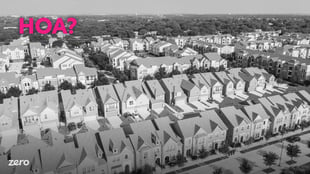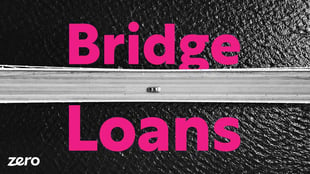Property Owner’s Association: POA vs HOA vs COA, the Same, Different?

Some homebuyers refuse to purchase a property if it is part of a property owner association. On the other hand, many other homebuyers intentionally seek out properties that are part of a POA because they find that there are many benefits associated with a property owner association.
If you're asking yourself what kind of fees are associated with living in an HOA, find out here.
But what exactly is a property owner association, and why do some people hate them while others love them?
In this article, we’ll be covering everything you need to know about POAs, including how they differ from COAs and HOAs.
POA vs HOA vs COA: What Are Property Owner’s Associations?
Let’s start with the basics. What is a property owner’s association? Well, a property owner association covers a wide range of property types, including condos, single-family residential homes, townhomes, and possibly even commercial property.
A property owner’s association will typically oversee various rules and regulations regarding property management. These rules and regulations may include zoning restrictions, approving new developments, denying certain updates, and protecting the long-term real estate interest of the covered area.
This area can be a neighborhood, a part of town, or even a few different areas simultaneously. When you hear the term property owner’s association, envision a Homeowner’s Association (HOA), but on a larger scale.
What is an ROA?
An ROA is a real estate acronym that applies to residences. The acronym stands for residential owner’s association, and an ROA functions like a property owner’s association.
Purpose of a Property Owner’s Association (POA)
A property owner’s association has numerous purposes. Some of the most common purposes include protecting the value of properties in a specific area and maintaining neighborhood or community common areas.
Protecting the value of properties in a specific area is a major focus of a POA. If you’re wondering how a POA protects the value of a property, it typically comes down to the rules and regulations put into place.
For example, POAs can ensure that lawns are mowed regularly or that bushes do not grow to a point where they are out of control. They also ensure that homeowners don’t store junk in their front yards, like old mattresses, appliances, or inoperable cars.
A homeowner living in a POA is probably going to be required to maintain the exterior of their home as well. So, if a particular house’s siding is falling apart or the gutters are hanging off of the home, the POA board will probably step in and enforce rules already in place stating such unpleasant sights must be fixed.
In addition to protecting the value of the properties within the community, the POA board will also maintain common areas. Plenty of communities come with added benefits, like pools, clubhouses, parks, trails, basketball courts, or tennis courts, among other types of common areas. A POA board usually oversees all of the common areas and amenities in a way that keeps the grounds looking taken care of.
Many homeowners appreciate the level of security that a property owner’s association can provide. If you take a lot of pride in your home, the last thing you’ll want is to live near someone who doesn’t feel the same about their house.
The quality of your neighbor's property can drastically affect the value of your home, as no one wants to live near people who neglect the upkeep and maintenance of their homes.
Homeowner’s vs Condo Owner’s Associations
Earlier, we mentioned another common real estate acronym known as HOA, but there’s also COAs, too. HOA is short for a homeowner’s association while COA is shorthand for a condo owner’s association.
What Is an HOA?
A homeowner’s association is in charge of overseeing a specific neighborhood or community. The homeowner’s association is a governing body that oversees the aesthetics of the area.
If you purchase a home within an HOA community, you will need to pay monthly, quarterly, bi-annual, or annual HOA fees. These fees can range greatly depending on the amenities that the specific HOA provides.
What Is a COA?
A condo owner’s association, or COA, is effectively the same thing as an HOA but it’s for condominium complexes instead of neighborhoods full of houses. Even so, many condo associations use the term “HOA” as it is more widely known and understood than “COA.”
What Does an HOA or a COA Do?
Homeowner and condo associations protect and enhance the value of properties by enforcing various exterior facing rules. Examples of rules include:
- Cutting and maintaining lawns
- Home exteriors cannot be neglected or left in disrepair
- Homeowners are only allowed to paint their homes, or front doors, specific colors
In addition to enforcing the rules, HOAs and COAs also maintain common areas. But unlike a POA, HOAs and COAs cover only specific neighborhoods or communities.
HOA vs POA: The Key Differences
So, what exactly is the difference between a homeowner’s association and a property owner’s association? Let's view both of them side by side.
|
Property Owner Association |
Homeowner’s Association |
|
|
Span of view? |
Numerous neighborhoods, sections of a town, commercial buildings, and residential buildings |
Oversees a specific neighborhood or community |
|
Membership |
Mandatory or voluntary depending on the area |
Mandatory or voluntary depending on the area |
|
What is the main goal? |
Community planning and long term value of the properties or specific area |
Protecting the value of homes within the community |
|
Scope of view? |
POAs are concerned about aesthetics as well as zoning and planning |
HOAs focus on aesthetics and rule enforcement |
|
Dues and fees? |
Dues and fees are required |
Dues and fees are required |
|
Fines for noncompliance? |
A POA can fine a property for not complying with the agreed-upon rules or standards |
An HOA can fine a property for not complying with the agreed-upon rules or standards |
|
Who are the board members? |
Property planners and various homeowners within the designated area |
Board members are elected within the community |
Our Mortgage Learning Center features blogs on a wide range of mortgage and refinancing topics.
Protect Your Assets
Oftentimes, purchasing a property is the largest purchase you will ever make in your life. When you purchase a home within a property owner’s association, a homeowner’s association, or a condo owner’s association, you are protecting your biggest asset.
Buying a property within an HOA, POA, or COA can protect the value of your asset, and helps the asset appreciate over time. The governing body will ensure that all of the homes within the community are well-maintained and remain in compliance with the agreed-upon rules and regulations. You’ll never have to worry about living next to someone who has overgrown bushes or detached gutters again.
Let's Get You Into a New House!
This page last updated: October 10, 2022
Read more on this topic below.

When you buy a house and start making mortgage payments, your payment consists of four different components, known...

If you have gone through the pre-approval process but need to take a deeper dive into how much house to buy,...

The vast majority of mortgage loans require you to put down a certain percentage of the selling price upfront....

Whether you’re a first-time buyer or you’ve purchased a home before, you’ve likely heard of a homeowner’s association....

People buy their homes for a number of reasons. Affordability, stability, and comfort are some of the most...

There’s a lot of expenses to keep in mind when you’re thinking about buying a home. Between the price of the home, property taxes, your mortgage...

Conventional loans are mortgages offered by private lenders, banks, and institutions that are not backed by the government. Unlike FHA, USDA,...

Research indicates that 58% of homeowners in HOA communities and single-family homes pay an average monthly fee...

Private mortgage insurance is something millions of homeowners pay for each year. However, this type of insurance does not protect

When you first set out to buy a home, it can feel like you’re taking an exam you forgot to study for. You have to make quick...

When looking to refinance or buy a house, the pre-qualified vs pre-approved mortgage debate can be...

A mortgage is often the largest monthly expense homeowners pay. The thought of reducing the amount...

A home doesn’t just fall into foreclosure status. There are stages and processes that take place behind the scenes before...

It’s likely that your mortgage loan will be the largest loan you have during your lifetime. Mortgages are not a one size...

Refinancing your home can save you thousands of dollars per year! When you extrapolate that savings over...

For many people, owning a home is part of the American dream. To make this dream a reality, most people will take out a...

Whenever you’re looking to buy a house, you’ll quickly realize there are a lot of fees associated with obtaining a mortgage....

A bridge loan is a short-term loan a borrower may use while a more long-term financing contract is finalized. Bridge...

A loan estimate is crucial to obtain when looking for a loan. This estimate not only gives you the details of a mortgage but also compares offers...

There are many moving parts and various people you’ll deal with throughout the homebuying process....

If you’re looking to buy a house, and do not have a mountain of cash saved up, you’ll need to consider getting a mortgage to help you finance this...

If you find a property that you’re highly interested in buying but are concerned that the seller might choose...

Buying a home? You’ll likely need to get it appraised before you receive the clear to close. If you’re wondering...

If you’re an active service member, a veteran, or the surviving spouse of a veteran, and you want to ...

Innovative and cost-effective home improvement ideas are all over the internet, especially when it comes to...

There’s no doubt, COVID-19 changed the world in countless ways and took us all by surprise. From an...

Whenever you are borrowing money, whether it’s for a new mortgage, a refinance, credit card, or car loan, you’ll hear...

If you’re new to buying a home, you probably have quickly realized the overwhelming amount of options there...

If you’ve already gone through the lengthy process of writing offers, securing financing, and arranging inspections for your...

One of the most important steps to buying a home is deciding on a mortgage loan and deciding on a loan involves settling on a good...

First time home buyers are often surprised when they learn about all of the expenses that are associated with ...

Purchasing real estate is not as simple as finding the right home, submitting an offer, and signing the closing paperwork; many...
